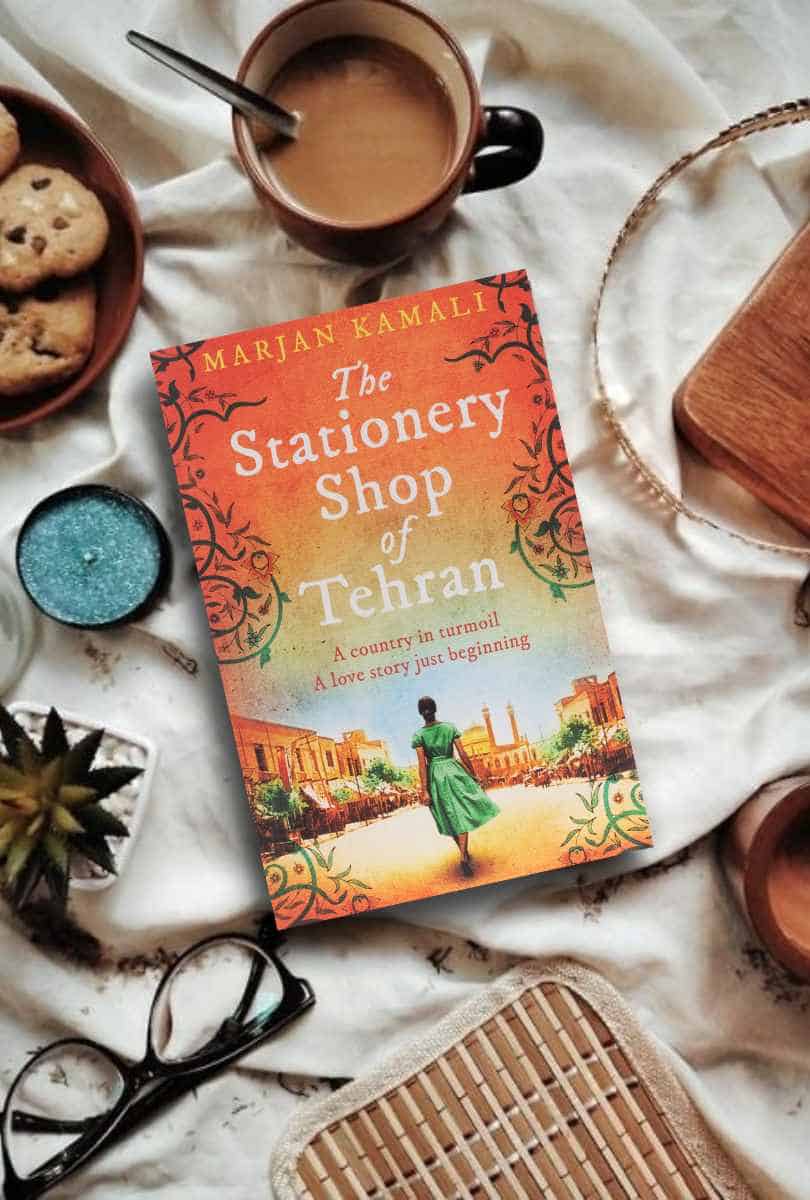STORY: 4/5 CHARACTERS: 5/5 LANGUAGE: 3/5 CONCLUSION: 5/5 OVERALL: 4/5
“Yes, she loved him. The truth of that was like a wave that washed over and submerged her in salty torrents, knotting her hair and stinging her nose, pulling the life out from under her. Of course she loved him. The earth was round, day turned into night, he was in front of her and she loved him.”
– Marjan Kamali, The Stationery Shop of Tehran
Summary:
As the 1950s began, Iran was welcoming a revolution. Their new Prime Minister brought in numerous reforms. There was education, dance, art, and freedom. As is the case with every politician, he too had both – staunch supporters and enemies. For young Roya and Bahman who shared similar political ideologies, marriage was the imminent plan.
Roya, the dreamy teenager found comfort in the literary oasis that was Mr. Fakhri’s stationary shop. And Bahmain, the handsome young man with a rebellious streak, a passion for Rumi’s poetry, and a love for justice, was a regular customer at the stationary shop. It was there that their love blossomed and bloomed.
“She could spend an entire afternoon just looking at fountain pens and ink bottles or flipping through books that spoke of poetry and love and loss.”
– Marjan Kamali, The Stationery Shop of Tehran
But there were people who didn’t want this to happen; for political and personal reasons. What started as a conflict between the pro-prime minister and anti-prime minister groups led to bloodshed. Needless to say, Bahman and Roya separated. What happens later is for you to read.
Story:
As much as it is about Roya, I feel that The Stationery Shop of Tehran is about Iran’s past when it was ruled by a progressive government. When girls didn’t have to cover their hair. When girls could dream of becoming scientists. When people felt safe. It becomes extremely relevant in the current context too, as in the last few months, many Iranian people, especially women, have come out to protest the oppressive regime.
It is also about Roya’s life after the separation – her education, work, and children. Her coping with a new life. Her memories of Iran as a youngster. The book can give the reader a basic insight into Iranian politics.
Characters:
Roya is a young girl who suffers more than she expected, in a wicked game of money and power. So is Bahman. They are both strong people, blown down by fate.
The other important characters of the book are Bahman’s domineering mother, Roya’s parents, and her sister Zari. My favourite character is Roya’s father. In the 1950s, he dreamt of his daughters studying hard, working, and making their own choices. He wanted that for all the Iranian girls. Oh, and how did I forget Mr. Fakhri, who runs the titular stationery shop in Tehran?
What I liked:
– The story is of heart-breaking loss, of fate that is already written, of misfortune despite one fighting hard. It is about the sad failure – of the couple and of the democracy of Iran.
– It gives us an idea of how Iran changed completely under the control of dictators. It has been all over the news for the last few months, anyway. It is also about the lucky Iranian girls who fled the country and probably are educated today.
– The letters between the lead characters, the only source of communication, are a delight to read. It is true that no matter how much technology advances, the joy of writing cannot be replaced. People who relish old-school things like writing letters, sending sweets to each others’ houses, waiting all day long to meet someone, and the like, will love this book.
– For people who love the romance genre, and the historical fiction genre I’m sure you have already heard about this book. You will probably understand this book better than me. It is a classic story of love beyond the norms of society.
What I didn’t like:
I felt that the writing style was way too simple. The book traverses through such violence and tragedy. But the language and writing are pretty basic – they fail to create intensity. Nevertheless, this also means the book is a must-try for beginners and young readers.
Cannot wait to read it? Buy your copy of The Stationery Shop of Tehran by Marjan Kamali.
